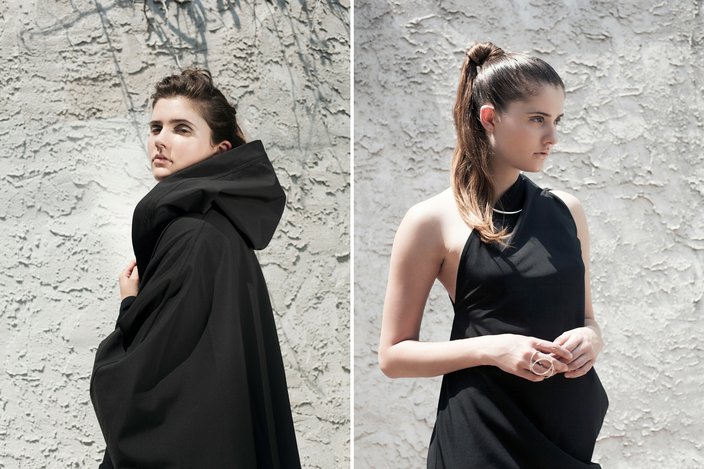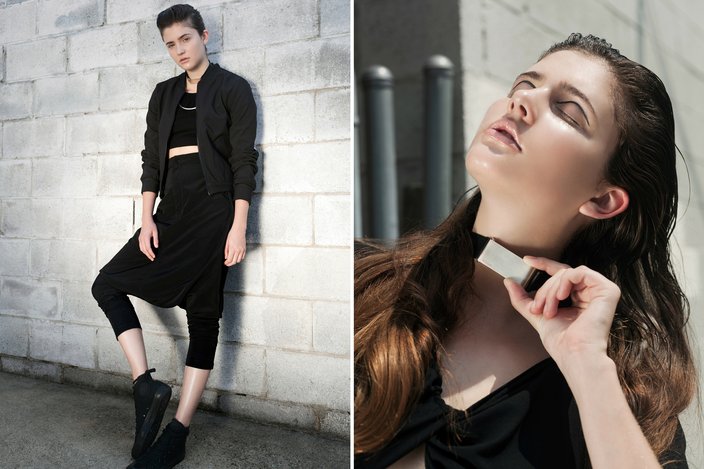
January 05, 2016
 Brian Lauer/NINObrand
Brian Lauer/NINObrand
Bela Shehu of SHEHU Design & Development Agency and NINObrand.
There comes a point (OK, many points) in a woman’s life when she seeks to reinvent herself: a bad breakup, a milestone birthday, the dawn of a new year. In today’s world of fast fashion, it seems easier than ever to enter a trendy retailer teeming with thousands of cheap style thrills and acquire one of infinite identities.
"Eighties babies" like me might remember their mothers scrounging to pay hundreds of dollars for just one elegant winter coat they wore through the next century. We are not our mothers’ daughters. Today, we jump at the chance to buy as many $20 coats as we can, just because we can. The modern fast fashion chain might feel like its own ecosystem, a microcosm of reverse inflation, except it’s not sustainable.
Aside from wreaking havoc on the environment, our time, our sanity, and our wallets, compulsively shoppable fast fashion has incited a personal identity crisis of epic proportions. Mass-produced, machine-cut clothes don’t fit any human form, yet we buy them anyway. We’re never comfortable in our clothes, so we’re never comfortable in our skin.
For all our fashion, we have no style. We constantly seek to reinvent ourselves, because we’re never content with who we are, what we have, and what we have to offer.
Enter Bela Shehu, Philadelphia’s premier fashion aesthete and head of SHEHU Design & Development Agency. Her crave-worthy, fit-conscious women’s line, NINObrand, has been praised as the future of style economy, where less is more and good taste is about setting intention. Just 34 pieces, NINObrand’s single, constantly evolving collection is designed to suit every woman’s every need, from morning to evening, home to office, and everywhere in between.
Known for their exceptional fit, Bela’s designs are 100 percent hand-stitched in the U.S. and shown only by appointment to the most discerning clientele. A choice combination of highly technical fabric, scrupulous tailoring, and cocoon-like comfort means Bela’s designs function like a second skin that’s meant to last a lifetime. Simply put, NINObrand is the slow antidote to death by fast fashion.
Bela Shehu's NINObrand collection.
Because I’m the fashionably challenged type who moves through life in amorphous running shorts, I jumped at the opportunity to chat with Bela about cultivating personal style. You can tell Bela is stylish because she says what she thinks. She doesn’t mince words. Her speech packs a strong punch that follows through and connects with something deep inside you, the part that wants to be a better person. Not like her, per se, but like you. The you who isn’t a slave to consumerism.
“I think, as human beings, we should shame ourselves for even considering fast fashion,” Bela said, right off the bat. “It should be as embarrassing as smoking. I cannot even bother with people who still participate in that level of consumerism. It’s a cluelessness about the environment and how we’re individually chipping in to destroy Earth’s resources.”
I naively asked Bela for her personal style rubric, a set of easy-to-follow rules that are notoriously elusive to Western women groomed to value quantity over quality. But Bela would have none of that. For her, style is as elemental as breathing. She believes our clothes should be as vital and precise as our internal organs. Her philosophy infuses new meaning into the old notion of wearing your heart on your sleeve.
“Fashion isn’t just a stylistic choice. It is a moral choice. Style is part of the whole self. That’s why there are no rules or guidelines when it comes to developing style. How you develop your style is how you develop your entire person, physically, emotionally. How do you develop your body? By diet, exercise, or lack thereof. Style is about being intuitive with your individual makeup.”
Everything about a person’s lifestyle is a design cue for Bela, from what kind of car a woman drives (can she get in and out of her SUV wearing a certain garment?), to whether or not she has kids (mothers do well with fibers that are machine washable and have stretch). First and foremost, she studies her clients’ footwear.
“If someone is always in a low oxford or booty, it says to the world ‘I walk; I live to stay on my feet.’ On the other hand, a person who suffers the pain that comes with high heels might desire to wear more delicate items that require more care, because this person believes choosing clothing and shoes regardless of comfort is worth what the clothes and shoes communicate for them.”
Bela Shehu's NINObrand collection.
I asked Bela about those low-quality winter coats we’re convinced we need to buy each year. Americans buy a new winter coat each season like they buy a new shovel every time it snows, along with gallons of milk that go sour, and loaves of bread that go moldy, and cases of bottled water that take up permanent residence in the trunks of their cars.
“Clothing should hold up for many, many wears. If you’re wearing something on a weekly basis, it should last you at least 5-8 years. Anything less than that and you’ve been duped,” she said.
NINObrand, on the other hand, is so focused on longevity its clothing comes with a 10-year guarantee.
“We actually make a really high-quality coat with this idea in mind. It’s sewn from a three-fiber interlock technical fabric that is waterproof, windproof, super lightweight, high-performance, and durable. As we continue working with this fabric, we will extend that guarantee, because I’m convinced the material will last much longer.”
Ultimately, Bela believes the best exercise in escaping the trap of fast fashion and discovering one’s enduring style would be a shopping experience guided by fit, not price.
“Go into a store you might otherwise never go into, and just search for fit. Spend a few minutes with garments that fit well and see how it feels. See what this would mean for you and how it could affect how much you consume. Maybe a $700 pair of pants would seem inexpensive based on that reaction. Because that could be the pair of pants you never take off. When you shop for price, you end up buying something that’s just almost quite right. You settle.
"What would it feel like to not settle? How much would one pay not to settle?”
 Sophie Cecile Xu/Stardust Magazine
Sophie Cecile Xu/Stardust Magazine Sophie Cecile Xu/Stardust Magazine
Sophie Cecile Xu/Stardust Magazine